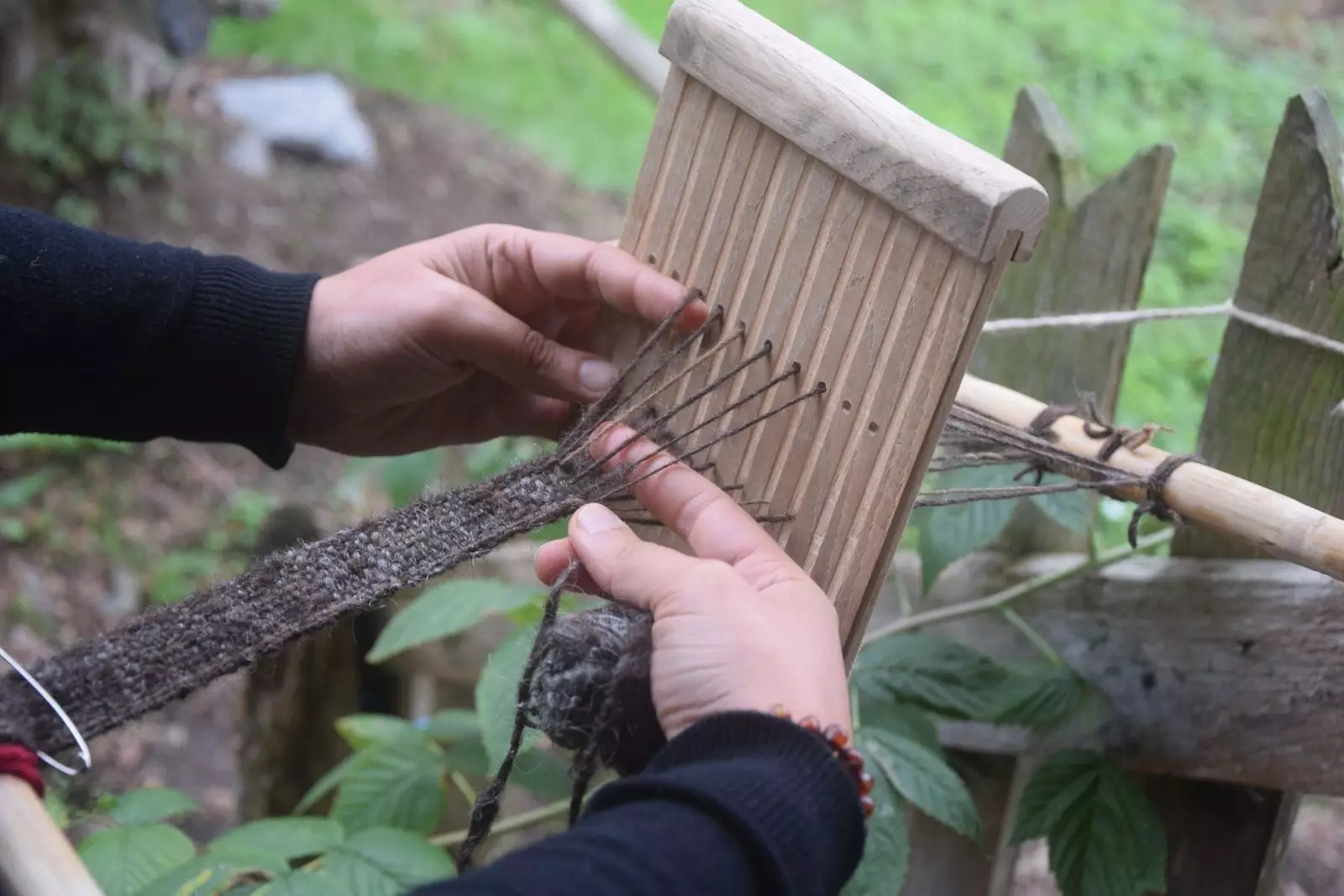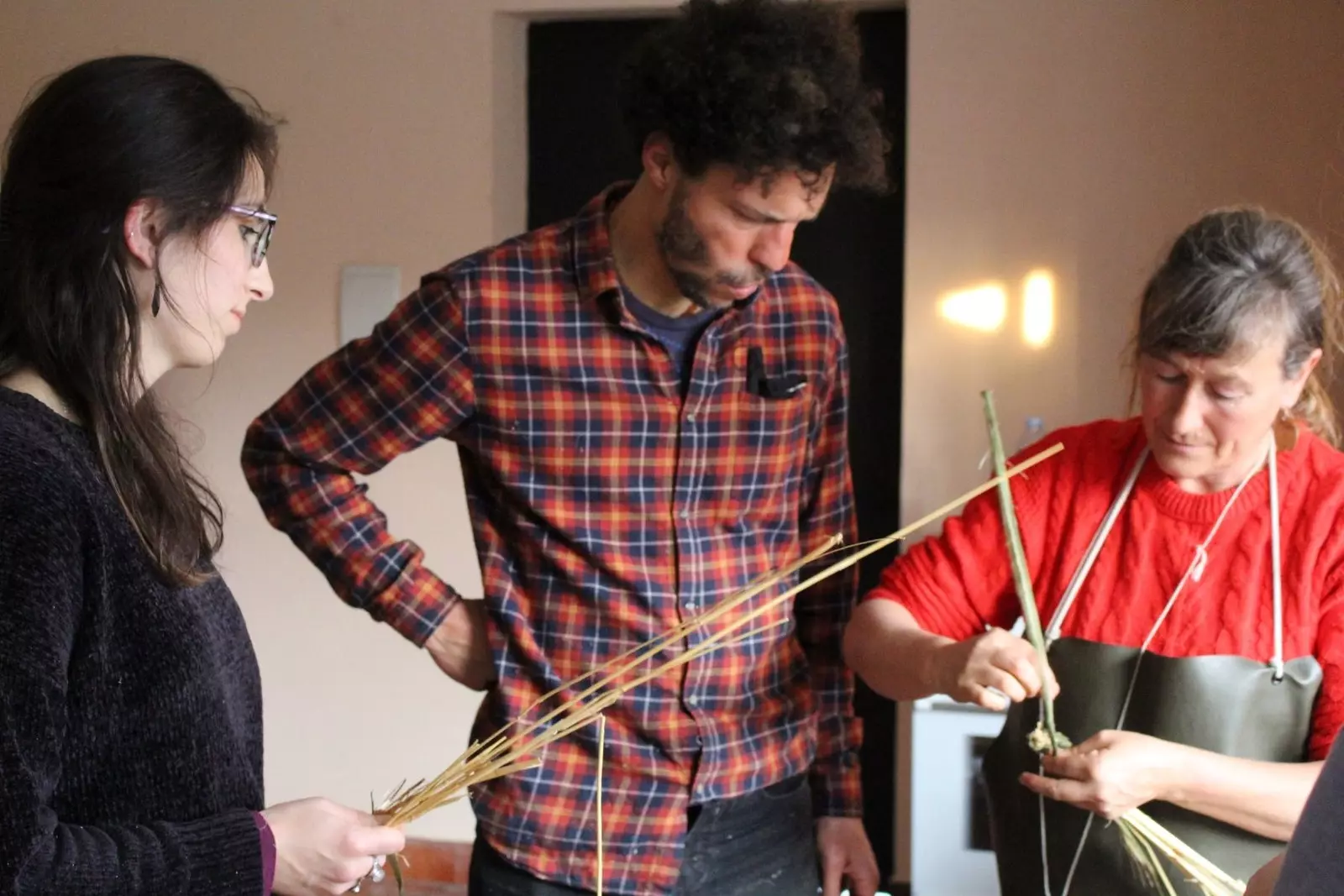
Paz González is one of the last remaining wool spinners-weavers in Asturias.
"In our country, more than 80% of traditional trades and knowledge are at risk of extinction . RuralArte organizes workshops and stays with artisans, recovering the figure of apprentice and promoting generational change in rural areas "This is how Beatriz Iglesias defines the mission of her young company, born in full confinement with the help of people like Edo Sadikovic , co-founder of Sende, the first coliving and rural coworking in Galicia.
"Even though I had been working on the idea for a couple of years, it wasn't until then that I was able to take shape," she explains. "The project was born, on the one hand, to value and avoid losing the knowledge and artisanal techniques of the rural environment and, on the other, to expand the training possibilities, beyond the agricultural sector, of people interested in the life, identity and culture of our peoples . Preserving this intangible heritage that has been passed down from generation to generation is essential when we talk about repopulation, sustainability or self-sufficiency she ponders.
Iglesias knows what she is talking about, since it is expert in agroecology and food sovereignty for almost five years, a sector to which she decided to change after several years working as a chemical engineer. Her work trips throughout Spain had something to do with this return to the land, to the origins: " I'm from a town, from the border between Galicia and León ", she says.
WORKSHOPS OF SQUARE TUMMYS, TRADITIONAL SPATRY, PUERMA WOOL WEAVING AND COLMO BASKETRY
"The first workshop was in September 2020, and to date we have held four different ones, on different occasions," recalls the entrepreneur. Right now, the days are available in which learn how to tan the skin and make a square tambourine in the ancient way of Extremadura and Portugal; that of initiation to work with esparto grass in the interior of Malaga; the one from traditional processing of Puerma wool , in Asturias and that of straw basketry (rye straw sewn with strips of bramble), in Lugo.

The RuralArte workshops range from the collection of the raw material to the complete elaboration of the artisan product
"All of them are celebrated in weekend format : Saturday and Sunday, several hours each day. What is special about them is that they are in very small groups (of five people) and in the own houses/workshops of the artisans and artisans , to ensure close treatment and quality training", explains Iglesias.
"Furthermore, you start from the origin, that is, knowing and preparing the raw materials : for example, gathering esparto grass and brambles in the mountains, or washing the recently sheared wool. Meals are also organized there, with typical products of the local gastronomy, and some artisans and artisans also offer their houses or farms for camping. If not, we rent a rural house for the group. In free time (afternoon-night), we try to make the apprentices learn more about the history and culture of the territory , for example, organizing a guided tour or a traditional music concert. In the end, each apprentice takes his own piece or work home, and also, material to continue practicing, if you want".
Soon, yes, they will be incorporated new initiatives to the program: "There are many traditional crafts that urgently need to be transmitted and we have not yet explored. In September (18-19) we repeated the square tambourine workshop in Peñaparda (Salamanca), and on October 3 and 4 we organized a new one, a linocut workshop for printing on fabric and paper . It will be in a village in Carral (A Coruña). With this we want to innovate and offer a new proposal: workshops focused on artistic entrepreneurship in rural areas . The detailed program is always sent by email to people subscribed to our newsletter."
IN SEARCH OF THE LAST ARTISANS
Finding that person who is perhaps the only one who knows a traditional trade in the whole country is not easy, but it is rewarding: "It is the part that, personally, I find most beautiful and, at the same time, in which it is necessary invest more time , because many of the people who retain this knowledge are already very old," reflects Iglesias. Now, one more difficulty is added to this research work: the global pandemic. "Especially in the context in which we are, organizing a workshop inside their house is a great effort for them".
To find those last bastions of ancient knowledge there is no clear formula. "I like reading press articles and documentaries that talk about trades in extinction ; from there you can pull a thread, although, sometimes, you find that the craftsman or craftswoman has already left the workshop or worse, he has died ". In the end, although sometimes local councils or associations contact them, what works best is the word of mouth . "The stories are what excite us and move us to visit these people. We don't know if there will be a workshop or not, but it is important to go there".
The rewards of these trips are measured in parameters that are almost foreign to today's world: "The world of art and crafts is totally new to me, and perhaps that is why I so admire those men and women who, with their hands, knead, weave, braid, polish, sew and shape unique and unrepeatable objects , which speak to us of an ancient time and teach us the value of patience and perseverance . Accustomed to a rhythm of consuming and producing too fast, craftsmanship is a revolutionary practice in these times . Whoever runs it daily says they save meditation classes!" Iglesias concludes.
